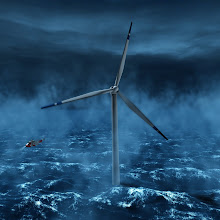For many years, fossil fuels have dominated the energy needs of the United States, with these fuels currently providing eighty-five percent of U.S. energy and seventy percent of U.S. electricity. But now, with high oil and gas prices, the United States has given the issue of renewable energy much more attention. Ethanol, a type of biofuel, has become more popular, while Texas, a state often linked to oil, has surpassed California as the greatest producer of wind energy in the country. The issue of renewable energy has also taken precedence in the Presidential Election, with Barack Obama and John McCain both supporting the continued expansion of renewable energy sources. The United States should definitely pursue this expansion, but the country has been addicted to fossil fuels for a long time, and much of America's technology is dependent on fossil fuels to function. This technology will take time to evolve to renewable energy sources, and renewable energy will likely follow that time frame.
However, America cannot keep using its current fossil fuel technology, not only because of high oil and gas prices, but also because of global warming. This year, the world will emit an estimated thirty billion metric tons of carbon dioxide, a greenhouse gas that heats the atmosphere. In fact, the Earth's temperature has already increased by 0.7 degrees Celsius. This figure may seem small, but temperature changes of two to three degrees may devastate species and ecosystems. These effects, though, are unpredictable, but both Presidential and Vice Presidential candidates acknowledge global warming as a reality. Sarah Palin, McCain's running mate, has been criticized for the postition that humans are the main cause of climate change, and TIME claimed she was more conservative on climate change than the current President Bush. Evidence, on the contrary, states that the probability that human activities are responsible for global warming is greater than ninety-nine percent. Despite this statistic, TIME has been accused of being liberally biased, and global warming has been discussed for many years without any focus until this election, where the environmental issue is now used to promote renewable energy.
Still, Obama and McCain both support two fossil fuels that may decrease greenhouse gas emissions - clean coal and natural gas. Coal is the most toxic of the three main fossil fuels, but clean coal is not burned like coal is burned. Instead, the coal is mixed with water and oxygen, then vaporized into a gas. This process does remove some pollutants, but carbon dioxide, the major pollutant, still remains. Some scientists tried to formulate a method of capturing carbon dioxide, but all funding for the project was canceled because of high costs. A coal imitator called E-Coal, which is derived from biological material, offers to reduce these emissions without losing any produced energy. The high costs of manufacturing the imitator, however, will likely limit the invention to the partial replacement of coal in power generation. Natural gas, in contrast to coal, is the cleanest of the fossil fuels. While the gas does emit carbon dioxide when burned, natural gas emits less additional pollutants than the other fossil fuels. Clean coal and natural gas remain limited because of the main disadvantage to fossil fuels - they are non-renewable energy sources. As I mentioned in my introductory post, fossil fuels take millions of years to form, and society is consuming those fuels much more rapidly that that rate of synthesis. Despite this drawback, clean coal and natural gas probably are the most feasible alternative energy sources until technologies powered by renewable energy can be developed.
In addition to these measures, McCain has also advocated two additional proposals - the construction of more nuclear power plants and offshore drilling. Nuclear power could be considered a renewable energy source, as ninety-five percent of nuclear fuel can potentially be recycled for additional power generation. Additionally, the risk of radiation exposure is low, with the average reduction of life expectancy being less than an hour, unlike the reduction in life expectancy from fossil fuels of three to forty days. The biggest drawback to nuclear power is not radiation, but the dependence of nuclear power plants on massive amounts of water for cooling. If there was a drought, a nuclear power plant would need to shut down, and this drawback has already forced a reactor in Alabama to go offline. Since the effects of global warming are unpredictable, nuclear power may or may not be reliable for the future.
Offshore drilling has become popular because of the huge demand for lower gas prices, but in reality, drilling would likely have little impact on gas prices. Even if America drilled in the Alaska National Wildlife Refuge, or ANWR, a protected zone that likely contains oil, as well as offshore, gas prices would only be reduced by about 3.5 cents, and, according to TIME, those savings would need several years to take effect. Again, TIME has been accused of being slightly liberal, but given the long time frame stated, the lowering in gas prices would likely be minimal. Despite this prediction, the ban on offshore drilling was recently lowered, but oil companies will likely not drill offshore until 2010. Speaking of the ANWR, though, Obama, McCain, and Joe Biden, Obama's running mate, all oppose drilling in the wildlife refuge, but Palin supports this proposal. According to the Anchorage Daily News, an Alaskan newspaper, Palin has supported renewable energy, but has "a 'failing record' on wildlife," as told by Kate Troll, the director of Alaska Conservation Voters. Now, most of Alaska does support this initiative, and supporters state that the environmental impact will be minimal. The National Resources Defense Council, in contrast, maintains that drilling in the refuge would fragment the habitat. No matter who wins the election, though, oil companies will likely drill offshore while the ANWR will remain what it was named for - as a refuge.
These differences, no matter how large they seem, are relatively insignificant. Barack Obama and John McCain are in virtual agreement on renewable energy, the less polluting energy sources of clean coal and natural gas, and global warming. On nuclear power, McCain only differs from Obama in the construction of nuclear power plants. This initiative may potentially provide more energy, but again, nuclear power is dangerously reliant on water. Offshore drilling, in fact, is the only real difference between the two candidates, and because of this, the issue is mentioned much more frequently in the news than renewable energy, despite the interest in the subject. Both candidates do talk about renewable energy, but when referring to each other or in joint appearances, which are broadcast the most, Obama and McCain refer to offshore drilling to try to make each other look bad and win over voters. These attacks have now made each candidate's energy policies seem, on television, centered on the candidate's support or opposition to offshore drilling, instead of renewable energy sources. Now that offshore drilling has been permitted, each candidate's energy policy could now become buried in a pile of disagreements on a host of other issues. To avoid this loss, these energy policies will need a new focus, one that should have been the focus from the beginning - renewable energy. Only then, with unity between Obama and McCain, will America begin to inform itself on renewable energy. With the end of the election in a month, that unity may indeed finally arrive.
Saturday, October 4, 2008
Subscribe to:
Post Comments (Atom)


2 comments:
I found your posts very informational, and you brought up many key points in relation to the election. In reference to your comment about Time's liberal bias-do you think the current (and "urgent") focus on renewable energy is a lot of hype related to gaining support in the election? Or do you think the issue will continue to recieve adequate coverage and ideas for solutions even after the campaign? I also think it is very contradicting that Palin so-called "supports" renewable energy movements, yet also supports drilling in the Alaska National Wildlife Refuge. Not only is that contradicting on the surface...but if temperature changes take out whole species and ecosystems (strongly affecting humans and our world) then destroying a wildlife refuge will also have a somewhat similar impact. With Palin's thinking process it seems we might as well keep warming the globe...
Britney,
I do not think that either candidate's renewable energy policy was fashioned to garner votes. I do believe, though, that the debate on offshore drilling was hype, as offshore drilling does not have a major impact on renewable energy policy. Now, renewable energy seems to have fallen from its formerly prominent position in the headlines, not only because of the economic crisis, but also because of the recent decision to lift the offshore drilling ban. When Obama and McCain referred to energy, they frequently invoked offshore drilling, as that issue was their only major difference on energy policy. With the resolution on offshore drilling, neither candidate has any reason to discuss it, and since Obama and McCain prefer to highlight their differences, America will likely hear much less in regards to energy policy. Then again, given the recent negative tone of the campaign, America may hear less on almost all issues. After the election, though, I think that both candidates will set aside their differences and work for the issues both have discussed.
On the effects of global warming on species and ecosystems, the related statistic is only a potential estimate. Global warming has received very little political focus until this election because science cannot firmly predict how a temperature increase would affect the Earth. Global warming has very diverse effects, but scientists know that the effects of global warming will be powerful. The world has only one Earth, and I think the world should use it wisely.
On a side note, I have a post on Plug-in Hybrids, a new automobile technology that can run on electricity, on my blog also.
Tommy
Post a Comment